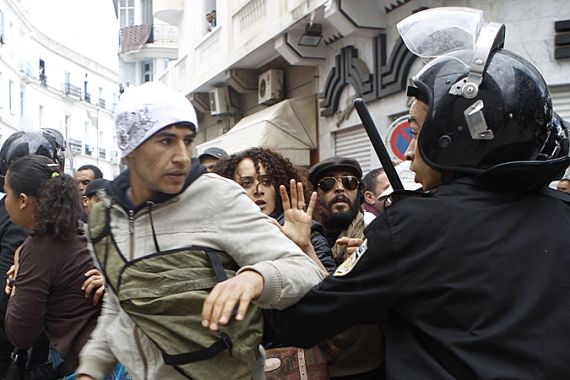Police use force to break up Tunisia protest
Demonstrators defy government ban amid growing anger over worsening economy and increasing clout of Salafis.

Police in Tunisia have fired tear gas to disperse a rally to commemorate Martyrs’ Day and protest against the worsening economic situation and lack of employment in the north African nation.
Nearly a thousand demonstrators turned out on Monday morning to a protest on Habib Bourguia Avenue in the capital Tunis, defying a government ban on protests.
Protesters sought shelter in neighbouring streets and shops, as police beat them with batons and fired tear gas into the scattered crowd.
A protest on Saturday was met with similar violence.
The coalition government, dominated by the conservative Ennahdha party, has come under increasing pressure from a population hungry for change.
Secular opponents accuse Ennahdha, which advocates political Islam, of turning a blind eye to a small but vocal ultra-conservative group of Salafi activists they fear are trying impose their austere interpretation of Islam on the country.
Salafis have held mass protests in recent weeks demanding the implementation of sharia, or Islamic law. At their last protest last month, Salafis attacked the national theatre in Tunis, tearing down posters and roughing up some actors.
Online dissent
Meanwwhile, a group claiming affiliation with cyberactivist collective Anonymous has published 2,725 emails belonging to Tunisia’s ruling Ennahdha party, including those of the prime minister.
In a video posted on a Facebook page belonging to Anonymous TN, a hacker wearing the trademark activist “Guy Fawkes” mask, said the emails were released in protest against Ennahdha’s alleged failure to protect the unemployed and artists who were attacked by Salafi Islamists.
The activist said the emails include phone numbers, bank transactions and invoices paid during Tunisia’s election campaign in October, in which Ennahdha won more than 40 per cent of parliament seats.
One of the emails was from Prime Minister Hamadi Jebali, a senior Ennahda official, to the Turkish embassy, attaching Foreign Minister Rafik Abdesslem’s CV.
“To the Tunisian government, we have kept a large part of your data secret. If you do not wish to see these published on the internet we ask you to work to the best of your ability to avoid internet censorship and to respect human rights and the freedom of expression in Tunisia,” the activist said.
It was not immediately possible to verify the authenticity of the emails or when they were accessed.
Government officials declined detailed comment on the security breach but said many of the emails appeared to be old.
“We are still trying to confirm if Jebali’s hacked account was from before he became prime minister or after,” Jebali’s spokesperson, Rida Kezdaghli, told the Reuters press agency.
New alliance
Amid rising political tensions, several Tunisian centrist opposition parties including the centre-left Progressive Democratic Party (PDP) have agreed to combine forces and gain more clout ahead of the general elections due in late 2012.
Its exact name and the make-up of its leadership was due be announced in the eastern city of Sousse on Monday.
Five other small parties and a group of independent politicians were expected to join its ranks.
“We will make the battle against the scourge of unemployment, for equality and the respect of Tunisians’ fundamental rights… our programme,” the PDP’s Maya Jribi said ahead of the formal announcement.
Six months after the election and 100 days after the new government took over “there is no clear strategy, no promise has been kept, the revolution which called for jobs and dignity is threatened,” she added.
— With reporting from Youssef Gaigi in Tunis